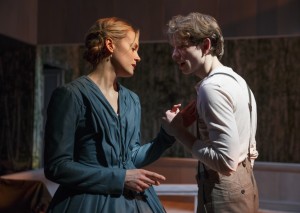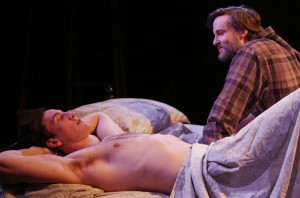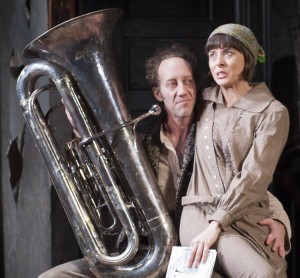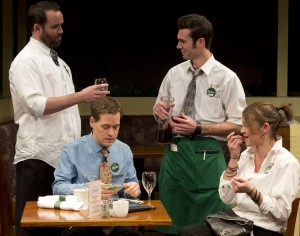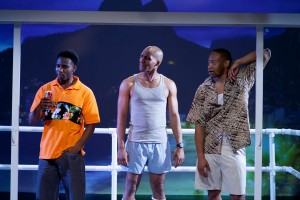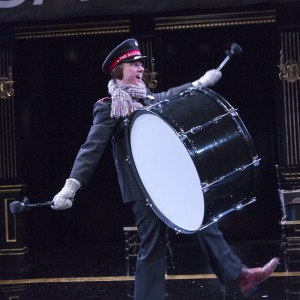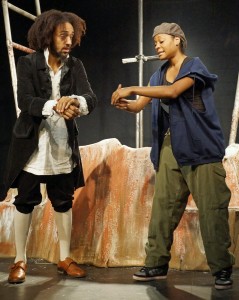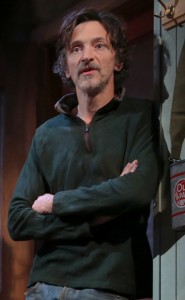Global power politics is the subject of Tom Dulack’s The Road to Damascus, an intriguing new play set in the near future. The time frame allows Dulack to invest his plot with thinly disguised current reality, or speculation that is not far-fetched: a female broadcaster, Nadia Kirilenko, works for the Pan-Arabya network, clearly modeled on Al-Jazeera, and a new Pope, Augustine, is from Africa.
The drama opens amid the confusion of major bombings in New York City, reported by Nadia. Were they the work of “a fourth-generation ISIS mutant,” the Army of God, or of the group suspected by the British, the Guardians of Mecca? Or perhaps the sect the French are inclined to blame, the Druze Freedom Party? Did the United Arab Emirates fund the terrorist attack?
Everyone expects the U.S. to retaliate against Syria, but Augustine intends to go to Damascus and offer himself as a shield against any bombing. What would the repercussions be if he does go? Will the U.S. or Israel bomb the Syrian capital if the Pope is there?
Although Dulack’s work has the tight construction of an Ibsen play, it feels more reliant on the coincidences of melodrama, although one that is compellingly Machiavellian. Happily, under Michael Parva's swift, precise direction, the actors provide vivid characterizations.
The linchpin is Nadia (Larisa Polonsky), who is having an affair with a State Department employee, Dexter Hobhouse (Rufus Collins). In Dulack's set-up, Nadia not only knows Augustine from his days as an activist in Darfur and Kinshasa, but she is a Chechnyan Muslim. The stunning actress has the looks of a newscaster, and she reveals the character's energy and ambition with persuasive television presence and diction. For his part, Collins has the dutifulness of a man who has sacrificed a personal life to his profession—he has three children, each by a different ex-wife.
The Pope’s right-hand man, Cardinal Medeiros (Robert Verlaque), secretly reports from the Vatican to the U.S. National Security Agency, embodied by Liza Vann’s utterly ruthless Bree Benson. And Benson gives marching orders to Ted Bowles, a State Department functionary who bridles at her overbearing attitude. Hobhouse also has his own contact in the Vatican, Bishop Roberto Guzman (Joris Stuyck), a college friend, who assists him in arranging a meeting with the Pope. But it seems everyone, including the Pope (given tremendous confidence and integrity by Mel Johnson Jr.), has a private agenda that involves using one of the other characters.
Dulack’s plotting is clear if schematic, and the characters are compelling. But The Road to Damascus provides little enlightenment on the sticking points of Middle East diplomacy, particularly the Palestinian question. Rather, it examines the assertion of power drenched in cynicism. It relies on its own rat’s nest of cross-purposes, which Dulack delineates effectively.
In spite of the solid craftsmanship, The Road to Damascus often feels like a first-rate TV show with overly familiar elements. The Benson character is one of those unscrupulous women in power easily recognizable to anyone who watches The Good Wife or How to Get Away with Murder or State of Affairs. The rivalry with her counterpart at State, Joseph Adams’s world-weary, hangdog Bowles, who is Hobhouse’s boss, echoes any number of subplots on seasons of 24 or The West Wing. And Verlaque’s Cardinal Medeiros might have stepped from The Name of the Rose or The Da Vinci Code, or from a Jacobean tragedy (e.g., The Duchess of Malfi).
There may be those who take issue with the grim finale, in which the greatest power exerts its ruthless ability to have its way, though not without foreshadowing. But the climax clearly underlines the irony of the title. On this road to Damascus, positions are immutable, and nobody has a conversion.
Tom Dulack’s The Road to Damascus plays at 59E59 Theaters though March 1. Evening performances are at 7 p.m. Tuesday through Thursday and 8 p.m. Friday and Saturday. Matinees are at 2 p.m. on Saturdays and 3 p.m. on Sundays. Tickets may be obtained by visiting www.59e59.org or calling Ticket Central at 212-279-4200 from noon to 8 p.m.










